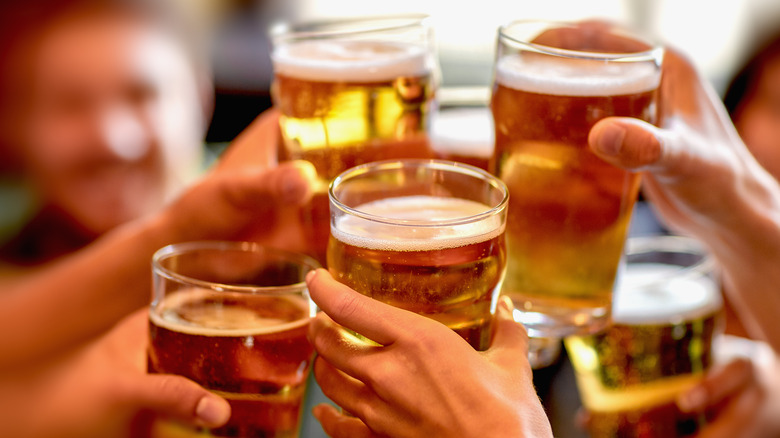What Drinking Alcohol Really Does To Your Brain
Many people choose to drink alcohol. While the occasional drink probably won't cause many issues, frequent alcohol consumption can lead to many negative side effects. Here's how this drink affects your brain.
Alcohol is often associated with having a "feel good" effect when consumed moderately (via Harvard Health Publishing). Depending on an individual's tolerance, even one drink can leave them feeling giddy, pleasant, and more sociable. This is because consuming alcohol releases endorphins in the brain that temporarily make you feel good.
While one or two drinks may keep these "fun" effects around, moderate to heavy alcohol consumption can lead to many problems. According to Medical News Today, the short-term effects of moderate alcohol consumption may include loss of inhibition, changes in mood, poor judgment, memory loss, depression, sleepiness, and reduced motor control. Drinking too much alcohol at a time can also lead to alcohol poisoning or an alcohol overdose. Left untreated, an alcohol overdose can cause permanent brain damage and even death.
The long-term effects of alcohol consumption include memory loss and brain shrinkage
Bad news for moderate drinkers: studies have suggested that regular drinking can lead to shrinkage of the hippocampus over time (via Harvard Health Publishing). Heavy drinking puts people at risk of even more damage. Multiple studies have found correlations between memory loss or brain volume loss and heavy drinking (via Health). According to Health, alcohol "kills cells and damages cellular networks in the brain," which can lead to damage in other parts of your body as well.
The worst effects of alcohol generally happen to people with an addiction to the drink. Maria Pagano, PhD, an addiction researcher and associate professor of psychiatry at Case Western Reserve University School of Medicine, suggests paying attention to how your friends act around alcohol to determine if you have a problem. "If you can drink other people under the table, or you see your friends leaving alcohol in their glasses and you know you could never do that yourself, those are signals you've got a genetic setup for developing an addiction," she told Health.
If you believe you have an addiction to alcohol and want to seek help, you can call the Substance Abuse and Mental Health Services Administration Helpline at 1-800-662-HELP (4357).

